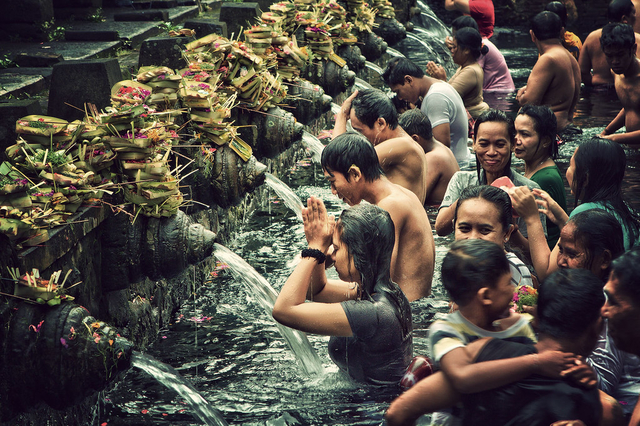
Melukat is one of the sacred rituals in Bali that uses water as a means to purify a person. The purpose of melukat is to cleanse the body, mind, and spirit, and to eliminate any negative influences.
It is believed that melukat can heal non-medical ailments and spiritual illnesses. Whether true or not, bathing in the waters of Balinese holy springs will undoubtedly help you feel more refreshed and energized.
Melukat can be performed at sacred springs, where rivers meet, on the beach by the ocean, or in family temple courtyards. Priests can conduct melukat at home. Bali has many popular places for melukat, with the most famous and visited being Tirta Empul. But aside from that, there are many smaller holy springs in various regions where Balinese people come for sacred cleansing.
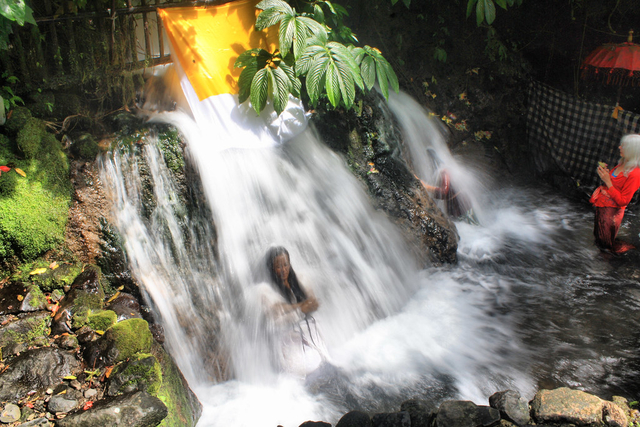
The most popular places in Bali for melukat:
"Melukat" comes from the Kawi word "lukat," an ancient language of priests, which means "to purify." In the Indonesian language, "lukat" signifies "to release" or "to liberate."
The act of cleansing in a holy spring is intended to purify a person from their "klesa" or impure qualities that cause suffering. Among these are "avijja" (awidya) - darkness and ignorance, "asmita" - pride and arrogance, "raga" - attachments and cravings, "abhiniwesa" (abhiniwesa) - fear of death, and "dvesa" - hatred and resentment.
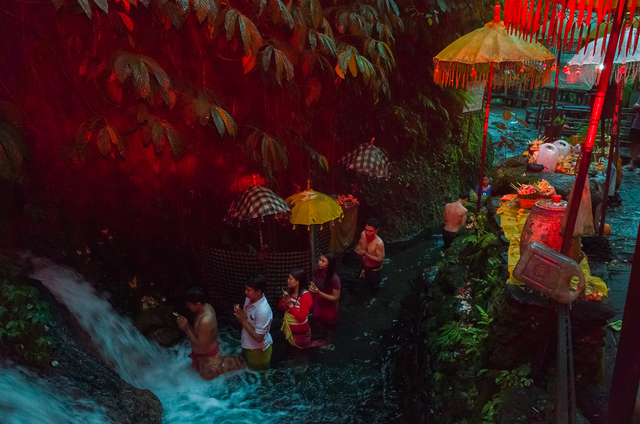
If these qualities dominate a person, it is considered that the person leads an impure life. Balinese people believe that impure qualities can be acquired by an individual through their past lives' "sancita karma phala" (accumulated karma) as well as in their current life's "prarabdha karma phala" (current karma).
There are several magical stories about the melukat ceremony. One of them recounts the tale of the goddess Dewi Uma, who was cursed and transformed into a fearsome monster known as Ra Nini. God Batara Guru cleansed Dewi Uma, restoring her original form. The transformed goddess then began teaching people how to purify themselves from sins and evil.
There are various types of special melukat ceremonies practiced in Balinese religion.
Melukat Astupungku:
The goal of this ceremony is to cleanse a person from negative influences caused by the process of birth and the imbalance of the three material qualities (sattva, rajah, tamas).
Melukat Gni Anglayang:
The purpose of this ceremony is to medically treat a person who is suffering from an illness. This ceremony is conducted by a balian or dukun (shaman).
Melukat Gomana:
The goal of this ceremony is to cleanse a child on their birthday or "anniversary" of their birth.
Melukat Surya Gomana:
Metaphorically, this ceremony aims to wash away the "stains" or "dirt" from a child.
"Melukat Semara Beda (Semara Beda):
Here, the cleansing of the groom and bride takes place during the traditional Balinese ceremony called Pawiwihan.
Melukat Prabu:
Conducted for leaders to fulfill their duties and bring prosperity to their subordinates.
Melukat Nawa Ratna:
Essentially carries the same meaning as Melukat Prabu.
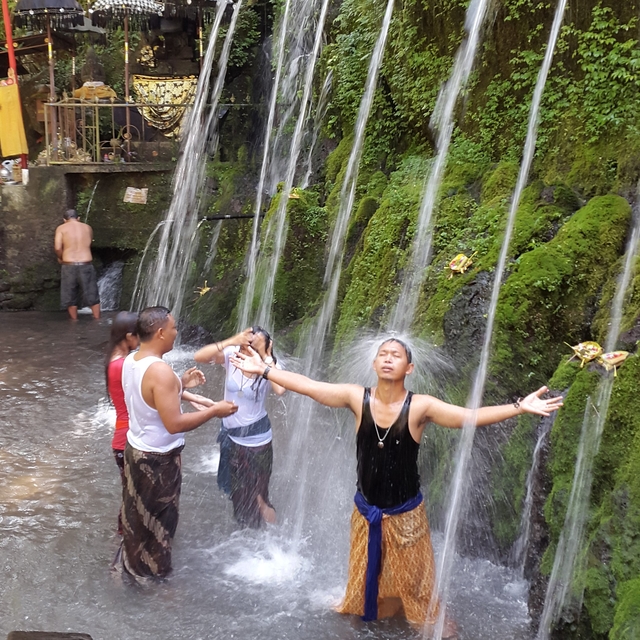
If you're going to perform melukat without a priest, it's better to bring a familiar Balinese person along, either a Balinese man or woman, who can guide you on proper behavior and the sequence of the ritual. Different sources have slightly different orders for passing through the fountains with holy water and varying rules for which fountains to use for the cleansing.
At the melukat locations, different fountains serve different functions and have unique effects. Some sources expel malevolent spirits, aid in fertility, bring prosperity, or remove curses. However, there are also sources where rituals are performed for the deceased, and of course, it's better for the living to avoid melukat there.
Most often, when Balinese people visit these sources, they go through all the fountains, pray at each one silently expressing their requests. They take three sips of water from the fountain, wash their head three times, and place their head under the water flow. After that, they move on to the next fountain.
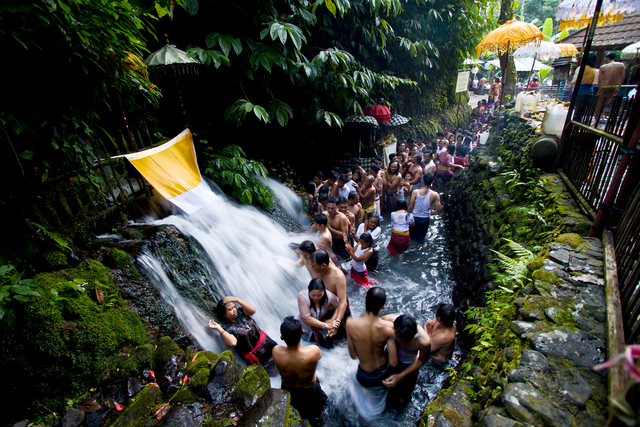
During the prayer, it is customary to recite the mantra:
Om sarira parisudhamàm swàha ("om sarira parisudhamam svaha")
Which translates to: "Lord, allow the physical and mental body of your servant to cleanse and sanctify."
If melukat is performed at a sacred spring, the mantra should be repeated under each water flow until wetting the head and before drinking water three times.
If melukat is done at the confluence of rivers or in the sea, the mantra should also be recited before cleansing. However, there's no need to drink water from the sea.
If you still decide to go on your own, observe closely how the Balinese behave and follow their lead precisely. If you can communicate with the Balinese at the springs, they will happily guide you on what to do.
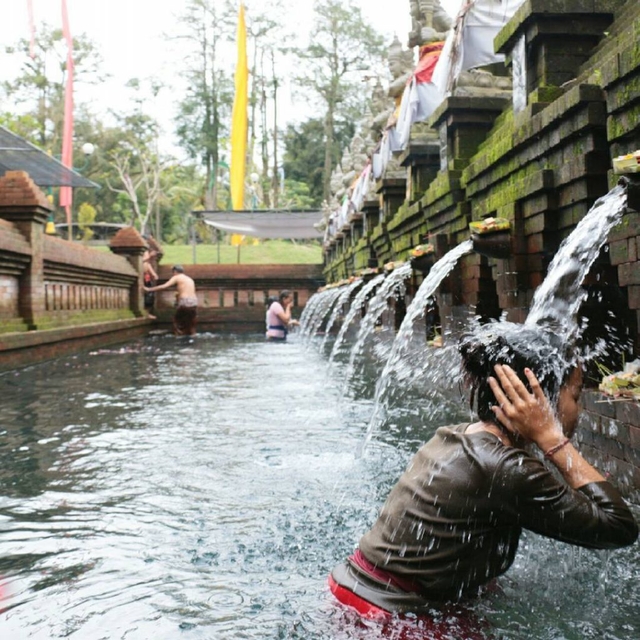
When conducting purification ceremonies independently, please adhere to the rules of conduct at Balinese sacred places:
1. Dress modestly. For participating in the melukat ceremony, both women and men should ideally be dressed in traditional Balinese attire or at least wear a Balinese ceremonial sarong. A suitable sarong for the ceremony can be bought quite affordably at traditional markets or stores. The sarong is worn around the lower body. Above the waist, men should wear a Balinese kebaya shirt, a regular shirt with sleeves, or a shirt with covered shoulders. Balinese men may be without a shirt.
2. Bring offerings to the spirits in the form of flower arrangements known as "chanangs" and aromatic incense sticks called "dupa." You can usually purchase these items from stalls near the temple.
3. Do not climb onto temple structures or sit on altars.
4. Do not stand higher than the priest. Do not position yourself directly in front of a seated priest or worshippers.
5. Women during menstruation and individuals with open bleeding wounds should not enter sacred areas. While no one will verify if you are menstruating, it is considered undesirable for women to undergo procedures with cold water during this time for health reasons.
6. Some temples prohibit entry with infants because Balinese tradition considers a child to be spiritually mature only after one of their teeth falls out. It's believed that a baby maintains a strong connection with the gods since they recently departed from their realm, making them not entirely human yet. Additionally, a baby becomes spiritually unclean during the birthing process.
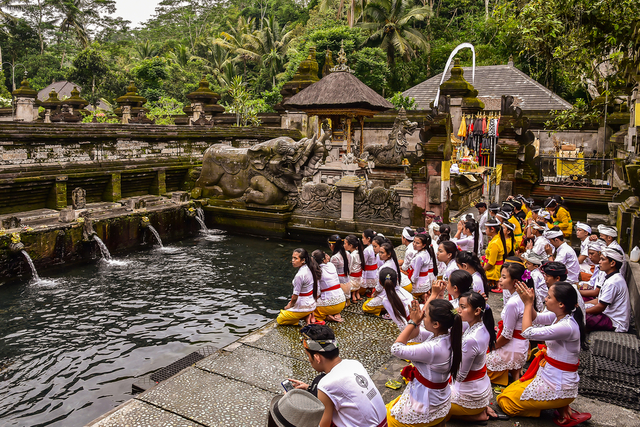
It is believed that it's best to perform the Melukat ceremony on the days of Kajeng Kliwon, Purnama (full moon), or Tilem (new moon). The Melukat ceremony can be performed multiple times depending on the goals and intentions.
You can add one right now!